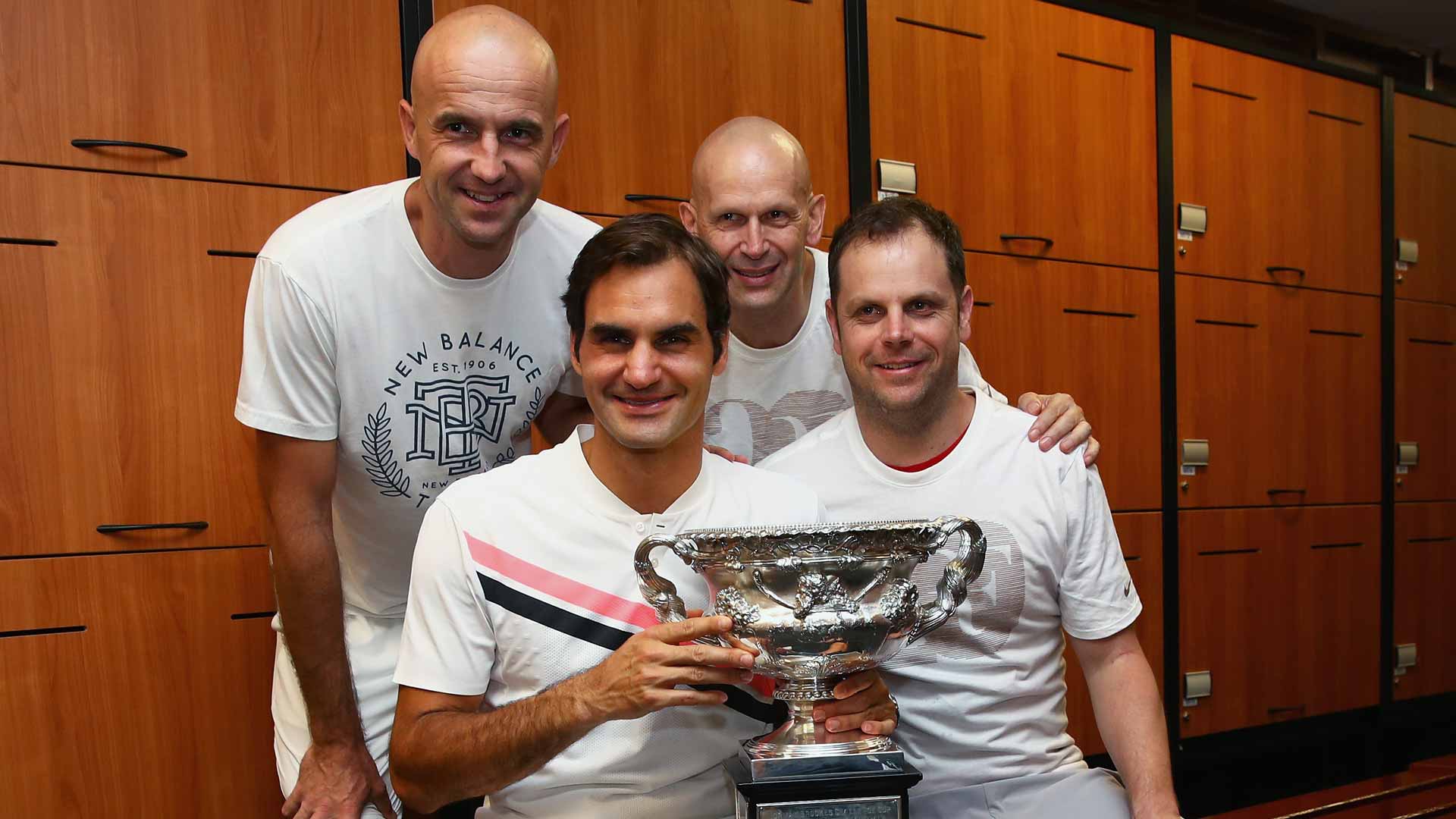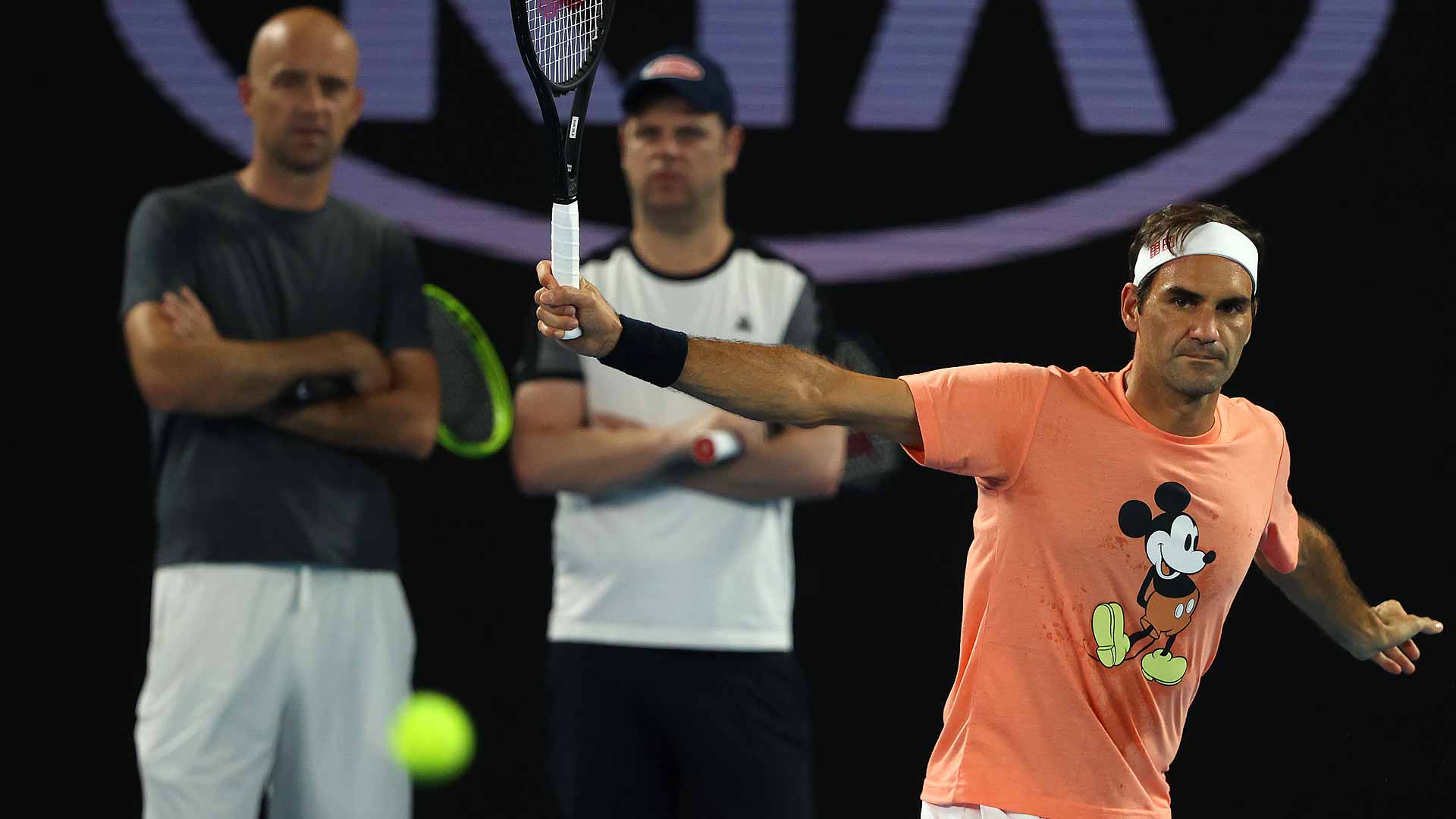Looking for Tennis and Racket Sports International News?
Federer's Farewell: Ljubicic & Luthi Share Their Favourite Roger Memories
Roger Federer played the final match of his legendary career at the Laver Cup alongside Rafael Nadal. His two coaches, Ivan Ljubicic and Severin Luthi, were in the crowd at The O2 supporting their charge one last time.
Ljubicic and Luthi both wrote for ATPTour.com about working with Federer, the friendship they shared and their favourite memories.
Ivan Ljubicic
I first met Roger when we were both playing Futures tournaments, making our start on the circuit. I was 17 and he was 15. Roger was a talented, emotional kid.
But we actually got to know each other a bit later, in the early 2000s. We both won our first ATP Tour title in 2001, when he took a trophy in Milan before and I did the same in Lyon later in the year. We were already sharing jokes about that back then.
Speaking of jokes, I only have funny memories of Roger — there are not many serious ones! Roger privately is a very goofy and funny guy. We’ve had a lot of fun.
Sometimes it is hard to travel around the world without my family most of the time. But with him, it was never difficult. I never felt like I was working. There were always good times. With his spirit, he always made sure that we enjoyed our time with him.
You could also sometimes see funny things with Roger in public. He likes to scare people and jump out of nowhere as a joke. There is never a dull moment with him. Life with Roger is never boring!
[ATP APP]
In the locker room Roger is very well liked and is always very nice to everybody. He has understood, especially later in his career, the magnitude of what he represented to a lot of young players when he would meet them for the first time. He would make sure that everybody was very comfortable around him.
While I became Roger’s coach in 2016, I first knew him as an opponent. I competed against him 16 times during my professional career and for me the most impressive thing was that he did not play two of those matches the same way tactically. He would always bring something new to the court and make sure that you didn’t have any reference to learn from.
The problem with facing him is that he would play a match one way and show up next time and do something completely different. He was definitely the only player I ever faced who could play that way, and no matter what he did, it was at a very, very high quality. For me, this was very problematic because when you lose to somebody you say, ‘Okay, I’ll learn something from this time and get ready for the next one’, but with him it was just not possible.
When I started to coach Roger, I realised the way he is thinking about tennis is just different than anybody else. I think that was the biggest difference, that he had this big, big bag of tactics that he would pull out whenever he felt he needed it.
When you watch his matches, Roger was a very elegant and powerful player. He made it look very easy. You think that it’s all talent, but he was an incredibly hard worker.
I never said anything to him or asked him to do something to which he would say, ‘No, let’s cut something out or let’s do less.’ If anything, he would be the one who wanted to do more. Visually, his game looks easy. But behind his elegance and style there was a lot of hard work.
I will never forget the 2017 Australian Open, when he came back from injury to win his 18th Grand Slam title. For me it was the first Slam that I won as a player or as a coach. It was a very, very big moment. You could feel the emotions and the pressure.
Roger had not won a major since 2012. He never said it to me, but I felt like he approached me to coach him because he wanted something to change. Honestly, I always thought that he was doing things right and that it was just a coincidence that he had not won more majors during that time. To me, in some situations he was just unlucky.
But as a player, I don’t remember ever going through the emotions I did in Melbourne in 2017. When you compete, you have things on your racquet and the emotions are different. But when you are sitting there in the box, you can’t really do anything but shout. Sometimes it’s harder emotionally to sit and watch than play. That was a huge moment for me personally, but also for us as a team.
Roger enjoyed a remarkable career and we had a lot of fun in the process. We played 16 times against each other and have shared many memories on the same team. The time I got to be part of it is something that will always be special.
Federer celebrates his 2018 Australian Open title with his team. Photo Credit: Clive Brunskill/Getty Images
SEVERIN LUTHI
I first met Roger at the Swiss Junior Championships when I was 16 and he was 11. I remember there was a guy with a one-handed backhand and I thought, ‘Why is he playing a one-handed backhand?’ He was so small and thin.
A couple of years later, he came to the National Tennis Centre. I just remember a guy smiling in the restaurant and I had no idea why he was smiling. He had [a mark] on his face because I think he had fallen off a bike the week before. I thought, ‘Who is this guy?’
That was Roger. Little did I know he would become such an important part of my life.
Roger got better and better every time I saw him, and I was surprised. I would think, ‘How did that happen so quickly?’ Every six months he would get so much better.
I became the Swiss Davis Cup captain in 2005 and a couple of years later I began travelling with Roger as well. I learned quickly he was able to do anything on the court. For me, the most impressive part is that he was really playing the game. He was never working it. Even though there was a lot of work behind this, it looked so easy on court.
Sometimes for people it is tough to understand how much work he had to put into his game. It’s just fun to see him play.
We practised a lot with younger players. Obviously those guys were maybe nervous and very serious because they wanted to do a good job. Very often I thought about how amazing it was that it looked like he was the 15-year-old and the other guy was the 30-year-old. He always found a way to enjoy playing.
Photo Credit: Clive Brunskill/Getty Images
You could have done the most normal exercise, the most boring one, and Roger always found a way to enjoy it. Either he would imitate other players or make a different noise for every shot he hit. Roger just found a way to make it fun for himself and that was always very impressive. It showed me how much he enjoyed playing and still enjoys the sport.
Roger also always wanted to learn. He accomplished so much, but knew it was important to keep your feet on the ground. You should never think you know everything and he always liked to hear something from the outside. Many people ask me, ‘What are you going to tell a guy like Roger?’ I can tell you, these guys, they still want to know things every day. They always want to keep progressing.
For me, that is also something that makes the game more interesting for a guy like Roger. If he was always going to do the same things, he would have gotten bored sometimes. I think us as coaches, we always tried to implement new things, Maybe it was not completely different, but you wanted to do something a little bit different every day. That made it more interesting and he stayed awake like this. Otherwise it would have just been repetitive.
Something people might not realise is just how caring Roger is. In 2009 he lost a match against Jo-Wilfried Tsonga in Montreal after leading 5-1 in the third set. I was a bit disappointed after the match and then we were in the car. Roger was like, ‘Are you okay and everything?’ I said, ‘Yeah’. I was just disappointed and I always asked myself what I could have done better or different even though I knew it was 98 per cent up to him.
Roger told me, ‘I think sometimes you’re more disappointed when I lose a match than I am.’ That was probably true!
Until Roger made his decision to retire there was always hope, so we always tried to stay positive. That is something he was better at than anyone. I think Roger is really the world champion in being positive.
When he knew he would have to get surgery in 2016, he was so positive from the moment he made the decision. Roger told us, ‘When I’m back, I will be in better shape than ever. Now I have time for my family.’ I was like, ‘Yeah okay, but now you need to get surgery!’ He knew what was coming, but he had such a good attitude about it.
There were a few good moments last year when he was able to play again, but obviously it was more difficult because you have to be careful, you always need to know how much you could practise and often it was too much. Then you had to slow down again.
But I think a huge difference between Roger and a lot of players is that he also has had a life outside of the tennis court. It was very hard and he was disappointed when things were not going well, but then once he was away from the tennis or he was with his family, he also had another life. That made it so good for him, because he never felt he was missing something.
This period was tough, but I think Roger handled it unbelievably well. Like always.
When you subscribe to the blog, we will send you an e-mail when there are new updates on the site so you wouldn't miss them.



